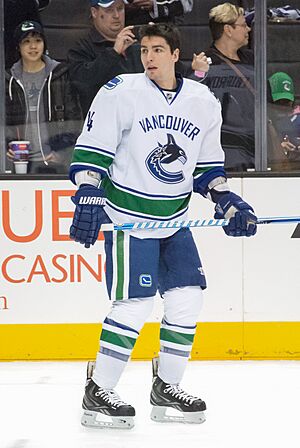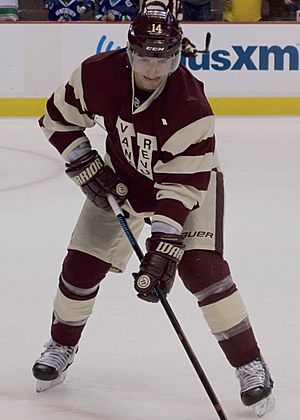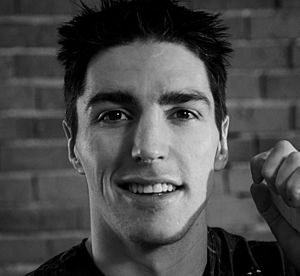Alex Burrows facts for kids
Quick facts for kids Alex Burrows |
|||||||||||||||||||
|---|---|---|---|---|---|---|---|---|---|---|---|---|---|---|---|---|---|---|---|
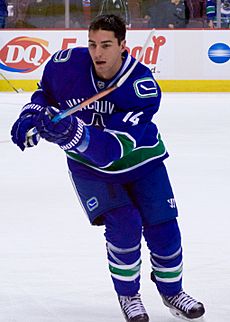
Burrows with the Vancouver Canucks in October 2015
|
|||||||||||||||||||
| Born | April 11, 1981 Pincourt, Quebec, Canada |
||||||||||||||||||
| Height | 6 ft 1 in (185 cm) | ||||||||||||||||||
| Weight | 197 lb (89 kg; 14 st 1 lb) | ||||||||||||||||||
| Position | Left wing | ||||||||||||||||||
| Shot | Left | ||||||||||||||||||
| Played for | Vancouver Canucks Ottawa Senators |
||||||||||||||||||
| National team | |||||||||||||||||||
| NHL Draft | Undrafted | ||||||||||||||||||
| Playing career | 2002–2018 | ||||||||||||||||||
|
Medal record
|
|||||||||||||||||||
Alexandre Ménard-Burrows (born April 11, 1981) is a Canadian professional ice hockey coach and former player. He is currently a player development consultant for the Montreal Canadiens of the National Hockey League (NHL). Alex played as a left winger. He spent most of his career in the NHL with the Vancouver Canucks. He was known for his energetic and sometimes annoying style of play, which helped his team. Later, he became a skilled player on the top scoring line. Burrows is also famous for making it to the NHL even though he was not chosen in the draft. He started in a lower league called the ECHL.
Before joining the NHL, Burrows also had a great career in ball hockey. He played in national and international tournaments during the summers. In 2005, he was named the best International Ball Hockey Player of the Year. He has also been added to the Canadian and International Ball Hockey Hall of Fame.
Contents
Playing Career
Starting in Junior and Minor Leagues
When he was young, Burrows played in the 1995 Quebec International Pee-Wee Hockey Tournament. He played for a team from La Presqu'île, near Montreal.
Burrows played two seasons in the Quebec Major Junior Hockey League (QMJHL) with the Shawinigan Cataractes. This started in the 2000–01 season. He scored 16 goals and 30 points in 63 regular season games. He then added three points in 10 playoff games. The next season, he got even better. He scored 35 goals and 70 points in 64 games. This was third-highest on his team. He then led his team in playoff scoring with nine goals and 21 points in 12 games. His team made it to the Conference Finals.
No National Hockey League (NHL) team picked Burrows in the draft. So, he started his professional career in 2002–03 with the Greenville Grrrowl. This team was in the ECHL, which is a lower-level minor league. Later in his first professional season, he moved to the Baton Rouge Kingfish. He finished that season with 32 points in 66 games. The next season, in 2003–04, he joined the Columbia Inferno. Early in that season, he signed with the Manitoba Moose. This team was in the American Hockey League (AHL), which is a step up from the ECHL. He played in two AHL games before going back to the ECHL. He finished the season with 29 goals and 73 points.
In the summer of 2004, the Moose signed Burrows again. He was sent back to the ECHL after a training camp that was not very good. But after another player got hurt, he was called back up on October 29, 2004. He scored his first AHL goal five days later. It was a game-winning goal for the Moose. He finished the 2004–05 season with Manitoba. He had 26 points in 72 games, playing a role on the team's fourth line.
Playing in the NHL (2005–2018)
Vancouver Canucks (2005–2017)
Burrows worked his way up from the ECHL. His hard work and energetic play in the minor leagues earned him a contract with the Vancouver Canucks. This was the NHL team connected to the Moose. He signed a "two-way contract" on November 8, 2005. This kind of contract means he could be paid differently depending on if he played in the NHL or the AHL. He had been at the Canucks' training camp earlier but was sent back to the Moose. After getting 30 points in 33 games with the Moose, the Canucks called him up on January 2, 2006. He played his first NHL game that day against the St. Louis Blues.
Eight days later, Burrows scored his first NHL goal against Ed Belfour of the Toronto Maple Leafs. He also got an assist, and the Canucks won 4–3. He quickly became a regular player for the Canucks. He scored his first NHL hat-trick on March 27, 2006, in a 7–4 win against the Los Angeles Kings. He finished his first NHL season with seven goals and 12 points in 43 games. People said Burrows made it to the NHL because of his hard work and tough style of play. He would create energy for his team and bother opposing players.
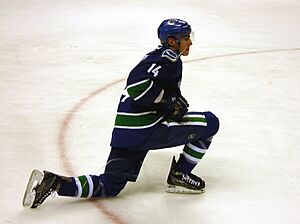
Burrows played his first full season with the Canucks in 2006–07. He was very important on the team's penalty kill unit, which was the best in the league. He didn't score much that season, with only three goals and nine points in 81 games.
In 2007–08, Burrows played well with center Ryan Kesler on the third line. They were good defensive forwards, helping to stop the other team's best players. They also scored some points. Burrows finished the season with 12 goals, 31 points, and a team-best plus-minus rating of +11 in all 82 games. The Canucks just missed the playoffs that year. Fans voted him to receive the team's Most Exciting Player Award and the Fred J. Hume Award, which is for the team's "unsung hero."
At the start of the 2008–09 season, Burrows stayed on the third line with Kesler. But after the All-Star break, the Canucks coach, Alain Vigneault, moved Burrows to the first line. He started playing with Daniel and Henrik Sedin on February 12, 2009. Burrows' style of playing hard towards the opponent's goal to get rebounds or tip-ins worked very well with the Sedins' passing plays. Over time, he became known as the "third Sedin" because they played so well together.
The Canucks had been on a losing streak in January. Burrows helped them break it. He scored a shorthanded goal with 82 seconds left in a game against the Carolina Hurricanes. This goal broke a 3–3 tie. This win started a great comeback for the Canucks. They then won their next 10 home games, setting a new team record. Soon after, the Canucks gave him a new four-year, $8 million contract on February 4, 2009. This was a big raise for him.
Burrows had a great season, scoring 51 points (28 goals, 31 assists) in all 82 games. The Canucks made it back to the playoffs. His 28 goals were the most ever by a player who started in the ECHL. In the 2009 playoffs, Burrows scored the winning goal in overtime in game four against the St. Louis Blues. This win helped the Canucks sweep the series. The Canucks then played the Chicago Blackhawks and lost in six games. It was later found that Burrows needed surgery on his left wrist. He finished the playoffs with three goals and one assist in 10 games.
In the 2009–10 season, Burrows scored two hat tricks in a row in January 2010. This was the first time an NHL player had done this since 2007. He was named the NHL First Star of the Week on January 11, 2010. Burrows had a fantastic season playing on the top line with the Sedins. He scored a career-high 35 goals, 32 assists, and 67 points in all 82 games. His 35 goals were the most on the Canucks. Fans voted him the team's Most Exciting Player for the third year in a row. The Sedins also played much better with Burrows on their line. Henrik Sedin won the Art Ross Trophy as the league's top scorer that year. In the playoffs, the Canucks beat the Los Angeles Kings but then lost to the Chicago Blackhawks again. Burrows scored three goals and three assists in 12 playoff games. It was later found that Burrows had a shoulder injury and needed surgery.
Because of his shoulder surgery, Burrows missed the first ten games of the 2010–11 season. When he returned, he continued to play with the Sedins. He recorded 48 points (26 goals and 22 assists) in the 72 games he played. The Canucks won the Presidents' Trophy for the first time in team history. This meant they were the best team in the regular season. In the 2011 playoffs, they played the Blackhawks again in the first round. The Canucks led the series 3–0 but then lost the next three games, leading to a game seven. In that deciding game, Burrows scored both Canucks goals, including the winning goal in overtime. This helped the Canucks defeat the defending Stanley Cup champion Blackhawks.
After beating the Nashville Predators and San Jose Sharks, the Canucks reached the Stanley Cup Finals for the first time in 17 years. They played the Boston Bruins. In Game 1, Burrows was involved in a moment where he appeared to bite an opposing player's finger during a struggle. The league reviewed the incident but decided there was not enough clear proof that he meant to bite. In the next game, Burrows scored his second overtime-winning goal of the playoffs. This goal came just 11 seconds into overtime, making it one of the fastest overtime goals in Stanley Cup Finals history. With two overtime goals in one playoff season, Burrows tied an NHL record. The Canucks led the series 2–0 and then 3–2, but they eventually lost the Stanley Cup to the Bruins in seven games. Burrows finished the playoffs with nine goals and eight assists for 17 points in 25 games.
On February 21, 2012, Burrows played in his 500th NHL game. He scored 28 goals, 24 assists, and 52 points in 80 games during the 2011–12 season. This helped Vancouver win a second straight Presidents' Trophy. In the 2012 playoffs, they faced the Los Angeles Kings and lost in five games. Burrows had one goal in the series. The Kings went on to win the Stanley Cup that year.
On March 16, 2013, Burrows scored a goal just six seconds into a game against the Detroit Red Wings. This set a new Canucks record for the fastest goal to start a game. It was also the fourth-fastest goal to start a game in NHL history. Burrows scored 13 goals and 11 assists for 24 points in the shorter 2012–13 season. He led the team in goals.
Burrows had a tough 2013–14 season because of injuries. On October 3, 2013, he broke his foot after blocking a shot. This made him miss 12 games. On December 1, he broke his jaw after being hit in the face with the puck. This injury needed surgery, and he missed 20 more games. He played in 49 games that season, scoring only five goals and 10 assists for 15 points. He didn't score his first goal until his 36th game. The Canucks also missed the playoffs that season.
In the 2014–15 season, the Canucks signed a new player, Radim Vrbata. Vrbata played with the Sedins for the first half of the season. Burrows played mostly on the second line. On October 30, 2014, Burrows was suspended for three games for an illegal hit to the head of an opposing player. Burrows finished the season with 18 goals and 15 assists for 33 points in 70 games. In the 2015 playoffs, he had two assists in three games. He missed the rest of the series due to a fractured rib.
Burrows finished the 2015–16 season with nine goals and 13 assists for 22 points in 79 games. He played on the second or third line. There was talk that the Canucks might end his contract early to play younger players. However, the team decided not to do that.
Ottawa Senators (2017–2018)
On February 27, 2017, Burrows was traded to the Ottawa Senators. In return, the Canucks received Jonathan Dahlén. Ottawa immediately signed Burrows to a two-year contract extension. He played his first game for the Senators on March 2, 2017, scoring both goals in a 2–1 win. Burrows played 15 games in the 2017 playoffs before getting hurt in Game 3 of the Eastern Conference finals. This ended his season. His Ottawa Senators team lost to the Pittsburgh Penguins in seven games.
On February 7, 2018, Burrows was suspended for ten games. This was for hitting an opposing player in the head with his knee. Burrows said, "Obviously, I messed up on that one. I let the emotions get the best of me." While he was suspended, the Senators tried to move Burrows to another team, but no other NHL team claimed him.
Burrows' first full season in Ottawa was not as good as hoped. He scored six goals in 71 games. On June 27, 2018, the Senators ended Burrows' contract early.
Life After Playing Hockey
On July 6, 2018, it was announced that Burrows had retired from playing. He then joined the Laval Rocket as an assistant coach. The Rocket is the American Hockey League (AHL) team connected to the Montreal Canadiens. On February 24, 2021, Burrows became an assistant coach for the Canadiens. After three seasons coaching the Canadiens, Burrows moved into a player development role in July 2024. In this role, he helps young players improve their skills.
Playing for Canada
After his seventh NHL season, Burrows was invited to play for the Canadian national team. This was for the 2012 IIHF World Championship in Finland and Sweden. His Vancouver Canucks team had been eliminated from the playoffs, so he was available to play. At 31 years old, he was the oldest player on the Canadian team. In his first game for Team Canada, he hit his head after colliding with two players. He left the game because there was concern he might have a concussion. He returned to play a week later. He scored his first goal for Canada in a 5–3 win against Finland. In the next game, he scored a shorthanded goal and was named player of the game for Canada.
Ball Hockey Career
Burrows started playing organized ball hockey when he was 19. In 2001, he won his first national championship with the Montreal Red Lites. Burrows continued to win the national championship every year he played with the Red Lites. He was the top scorer in the tournaments in 2002 and 2003. He was also named to the All-Star Team from 2002 to 2004. In 2005, Burrows scored two goals in the national final to win his fifth straight Canadian title with the Red Lites. He was named the Tournament MVP. He led the Red Lites to a sixth straight title in 2006.
Burrows first played for Canada's national ball hockey team in the 2003 World Championships in Switzerland. He helped Canada beat the Czech Republic 6–1 in the final. He was tied for the most points in the tournament and was named the Most Valuable Forward. Two years later, in 2005, he won his second World Championship with Canada. He was named the 2005 International Player of the Year. The next year, a Canadian poll voted him the country's greatest ball hockey player ever.
Burrows has said that ball hockey helped him stay fit and disciplined, which helped him in the NHL. After his first full season with the Canucks in 2006–07, Burrows stopped playing ball hockey. In 2010, he was added to the Canadian Ball Hockey Hall of Fame. He is also a member of the International Street and Ball Hockey Federation (ISBHF) Hall of Fame.
Alex Burrows is the president of The Alex Burrows Tour. This group organizes large ball hockey tournaments. These tournaments are known for being open to everyone and bringing together many players. They offer some of the best tournaments across Canada. The Alex Burrows Tour has more than 17 different categories for men, women, and mixed teams from all over North America.
In February 2020, Alex Burrows helped start the Ligue Nationale Hockey Balle, which is a professional ball hockey league.
Personal Life
Burrows was born in Pincourt, Québec. His father moved from London, England, when he was 23. His mother is from Québec and is an elementary school principal. Burrows has two sisters. He grew up speaking mostly French.
In July 2010, Burrows married his longtime girlfriend, Nancy Roy. On April 27, 2011, Nancy gave birth to their first child, a girl named Victoria. Alex became a father for the second time on March 4, 2013, to another daughter named Lexie. On November 15, 2015, their third child and first son, Jacob, was born. They live in Montreal during the hockey off-season.
Burrows was very close friends with his former Canucks teammate Luc Bourdon. Luc sadly passed away in a motorcycle accident in May 2008. In the hockey season after Luc's death, Burrows sometimes celebrated goals by pretending to shoot a bow and arrow. This was a gesture that Bourdon used to do when he scored. Alex and his wife remained close to Bourdon's girlfriend.
Career Statistics
Regular Season and Playoffs
| Regular season | Playoffs | |||||||||||||
|---|---|---|---|---|---|---|---|---|---|---|---|---|---|---|
| Season | Team | League | GP | G | A | Pts | PIM | GP | G | A | Pts | PIM | ||
| 2000–01 | Shawinigan Cataractes | QMJHL | 63 | 16 | 14 | 30 | 105 | 10 | 2 | 1 | 3 | 8 | ||
| 2001–02 | Shawinigan Cataractes | QMJHL | 64 | 35 | 35 | 70 | 184 | 10 | 9 | 10 | 19 | 20 | ||
| 2002–03 | Greenville Grrrowl | ECHL | 53 | 9 | 17 | 26 | 201 | — | — | — | — | — | ||
| 2002–03 | Baton Rouge Kingfish | ECHL | 13 | 4 | 2 | 6 | 64 | — | — | — | — | — | ||
| 2003–04 | Columbia Inferno | ECHL | 64 | 29 | 44 | 73 | 194 | 4 | 2 | 0 | 2 | 28 | ||
| 2003–04 | Manitoba Moose | AHL | 2 | 0 | 0 | 0 | 0 | — | — | — | — | — | ||
| 2004–05 | Columbia Inferno | ECHL | 4 | 5 | 1 | 6 | 4 | — | — | — | — | — | ||
| 2004–05 | Manitoba Moose | AHL | 72 | 9 | 17 | 26 | 107 | 14 | 0 | 3 | 3 | 37 | ||
| 2005–06 | Manitoba Moose | AHL | 33 | 12 | 18 | 30 | 57 | 13 | 6 | 7 | 13 | 27 | ||
| 2005–06 | Vancouver Canucks | NHL | 43 | 7 | 5 | 12 | 61 | — | — | — | — | — | ||
| 2006–07 | Vancouver Canucks | NHL | 81 | 3 | 6 | 9 | 93 | 11 | 1 | 0 | 1 | 14 | ||
| 2007–08 | Vancouver Canucks | NHL | 82 | 12 | 19 | 31 | 179 | — | — | — | — | — | ||
| 2008–09 | Vancouver Canucks | NHL | 82 | 28 | 23 | 51 | 150 | 10 | 3 | 1 | 4 | 20 | ||
| 2009–10 | Vancouver Canucks | NHL | 82 | 35 | 32 | 67 | 121 | 12 | 3 | 3 | 6 | 22 | ||
| 2010–11 | Vancouver Canucks | NHL | 72 | 26 | 22 | 48 | 77 | 25 | 9 | 8 | 17 | 34 | ||
| 2011–12 | Vancouver Canucks | NHL | 80 | 28 | 24 | 52 | 90 | 5 | 1 | 0 | 1 | 7 | ||
| 2012–13 | Vancouver Canucks | NHL | 47 | 13 | 11 | 24 | 54 | 4 | 2 | 1 | 3 | 6 | ||
| 2013–14 | Vancouver Canucks | NHL | 49 | 5 | 10 | 15 | 71 | — | — | — | — | — | ||
| 2014–15 | Vancouver Canucks | NHL | 70 | 18 | 15 | 33 | 68 | 3 | 0 | 2 | 2 | 21 | ||
| 2015–16 | Vancouver Canucks | NHL | 79 | 9 | 13 | 22 | 49 | — | — | — | — | — | ||
| 2016–17 | Vancouver Canucks | NHL | 55 | 9 | 11 | 20 | 53 | — | — | — | — | — | ||
| 2016–17 | Ottawa Senators | NHL | 20 | 6 | 5 | 11 | 9 | 15 | 0 | 5 | 5 | 18 | ||
| 2017–18 | Ottawa Senators | NHL | 71 | 6 | 8 | 14 | 59 | — | — | — | — | — | ||
| NHL totals | 913 | 205 | 204 | 409 | 1,134 | 85 | 19 | 20 | 39 | 142 | ||||
International Play
| Year | Team | Event | Result | GP | G | A | Pts | PIM | |
|---|---|---|---|---|---|---|---|---|---|
| 2012 | Canada | WC | 5th | 5 | 3 | 0 | 3 | 2 | |
| 2014 | Canada | WC | 5th | 6 | 0 | 1 | 1 | 4 | |
| Senior totals | 11 | 3 | 1 | 4 | 6 | ||||
Awards and Honors
ECHL Awards
| Award | Year |
|---|---|
| All-Star Game | 2004 |
Vancouver Canucks Awards
| Award | Year |
|---|---|
| Most Exciting Player Award | 2008, 2009, 2010 |
| Fred J. Hume Award (unsung hero) | 2008 |
| Vancouver Canucks Ring of Honour | Inducted 2019 |
NHL Awards
| Award | Year |
|---|---|
| First Star of the Week | January 11, 2010 |
Ball Hockey Awards
| Award | Year |
|---|---|
| Canadian National Championship (Montreal Red Lites) | 2001, 2002, 2003, 2003, 2004, 2005, 2006 |
| CBHA All-Star Team | 2002, 2003, 2004 |
| World Championship (Canada) | 2003, 2005 |
| CBHA MVP | 2005 |
| ISBHF International Player of the Year | 2005 |
| Canadian Ball Hockey Hall of Fame inductee | 2010 |
 | Precious Adams |
 | Lauren Anderson |
 | Janet Collins |


